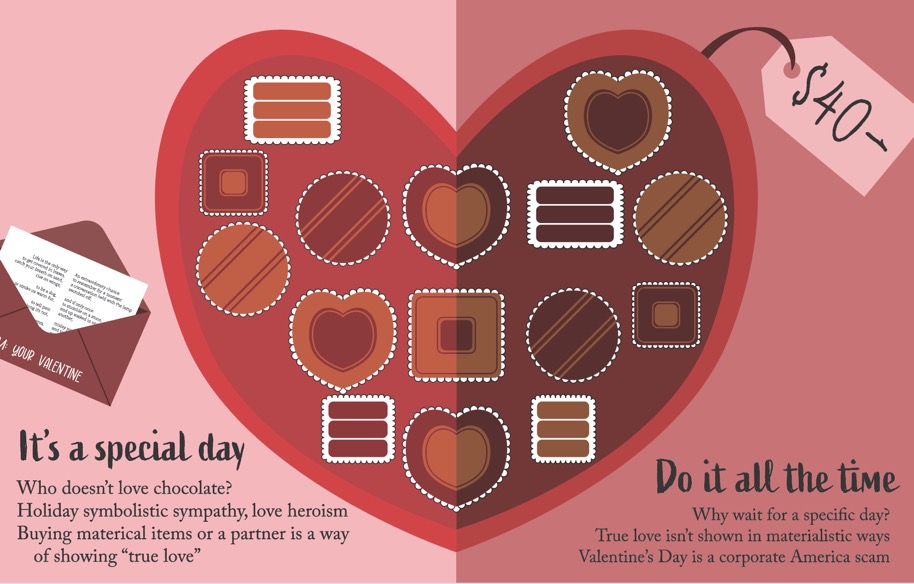
Illustration by Grace Faver | Washtenaw Voice
It’s a special day
By Lily Cole
Deputy Editor
As a little girl, I dreamed about a fairy tale-style love story. Listening to Taylor Swift’s “Fearless” album, I imagined what love could be. While that dream probably won’t come true, it’s still evident that many Americans, myself included, believe in true love.
According to reporting by CBS, “86 percent of Americans think true love exists. While 67 percent say they have experienced it themselves.”
When thinking about human nature a connection is needed to function, and anyone who has ever been in a supportive, loving relationship knows just how sweet it feels. In a secure relationship, room for growth and mutually beneficial connection is prevalent. You often feel protected and confident in yourself and your partner.
To be loved is to be safe.
Valentine’s Day confirms the fact through material items and the thought that goes into choosing the right gift, getting to know your partner well enough to pick something they’ll like, and feeling desired makes us feel good. The feeling of love releases oxytocin, dopamine, and serotonin, described as our “happy hormones.”
Healthline, a health and wellness brand, said, “when you’re attracted to another person, your brain releases dopamine, your serotonin levels increase, and oxytocin is produced. This causes you to feel a surge of positive emotion.”
Having someone who is there for you can also be beneficial for both partners’ mental health.
“When you love someone, you are invested in their health and well-being. We do this for each other in a loving, healthy relationship,” as stated by High Country Behavioral Health, a non-profit organization with affordable access to behavioral health services.
Some of this history associated with Valentine’s Day is a myth, but it doesn’t deny the tender nature of the holiday and the patron saint who supposedly started it all.
According to Britannica, Valentine’s Day may have taken its name from a priest martyred about 270 CE by the emperor Claudius II Gothicus. According to legend, the priest fell in love with a jailor’s daughter and signed a letter that said, “From your Valentine,” a saying still used today.
Valentine was also said to have performed marriages in secret, defying the rules of Claudius II, who thought single men made better soldiers and outlawed marriage. Seeing the unjust nature of this act, Valentine spared men from war and wed them to their lovers.
The story emphasizes the holiday’s sympathetic, loving and heroic symbolism.
And come on, who doesn’t love chocolate?
Do it all the time
By Caleb Henderson
Editor
What is the purpose of Valentine’s Day, really? Is it to show affection and appreciation for one’s partner? Because there’s 364 (365 during leap years) other days in the year for that.
Is it to shower one’s partner with extravagant gifts? Why wait until Feb. 14 when one can do so on March 14, April 14, or any other day of the year?
Is it to do something romantic with one’s partner? Again, why the wait?
Valentine’s Day in the media has always been depicted as an exclusive holiday that only couples can participate in, showing how much “true love” each party in a relationship possesses for one another.
However, over the years, as the modern dating scene has devolved, the holiday has deteriorated with it–to the point where viral videos are common of partners arguing and breaking up with each other over not buying each other “extravagant enough gifts,” and an entire spinoff holiday for women developing aptly titled: Galentine’s Day.
One of the reasons why the current divorce rate in the United States for first marriages is at around 50 percent, essentially a coin flip, according to Forbes, is because many conflate “true love” to be buying one’s partner materialistic things rather than paying attention to their actions.
While giving gifts and providing for each other is certainly an important aspect of any relationship, having it as the backbone of a partnership is a recipe for disaster.
At this point of the article, you may be wondering: what qualifications does this random newspaper editor have to be giving out relationship advice? Has he been in one himself, or is he in one now?
The answer to that question is while personally, I have not, I’ve rather observed what has worked for my parents throughout their 30-plus year marriage, a rarity not just in the black community but across the entire US population these days with only 26.2 percent making it that far according to The Hive Law, an estate planning service.
I believe “true love” isn’t shown by buying roses, teddy bears, taking your partner out to eat at a five-star restaurant, or purchasing a card on one specific day.
True love is loyalty across six months, a year, five years, a decade.
True love is being able to open up to your partner about anything and everything without judgment and knowing they’ll be there to support you no matter what.
True love is having a bond inseparable enough that the marriage vow “till death do us part” actually means something and isn’t just extra words in a wedding ceremony.
Valentine’s Day has never and will never represent true love. It is just a consumer holiday designed to make Fortune 500 companies rich from those trying desperately to fill that void in their relationships.

